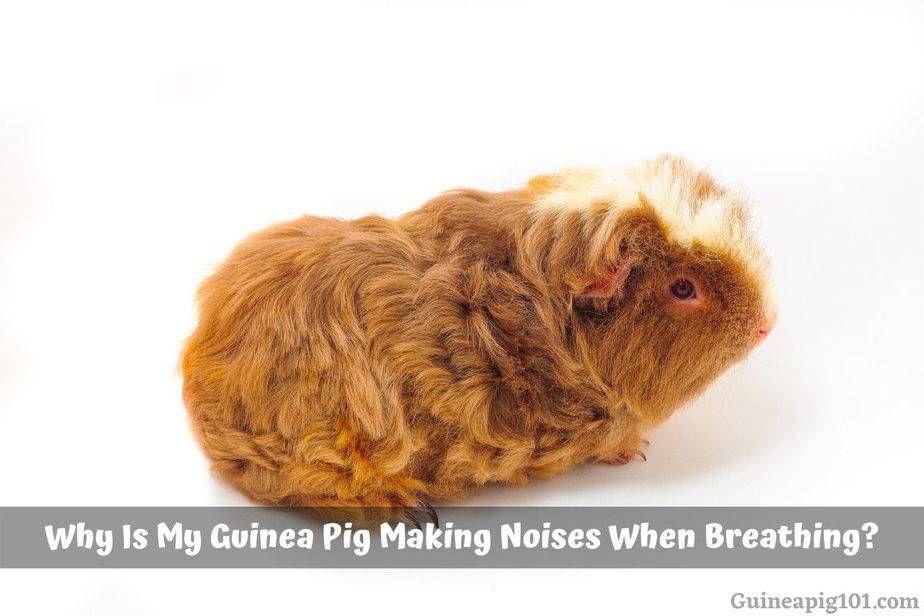Guinea pig is making strange noises while unable to breathe correctly; then you must be worried about its health. It is more dangerous if the guinea pig starts wheezing, which indicates some serious problems in breathing.
Your guinea pig is struggling to breathe if you find them panting, breathing through its mouth, or tilting its head. The widening of the nostrils while breathing also indicates shortness of breath. These problems are caused due to bacterial infections, deficiency of nutrients, allergies, etc.
Although it is a matter of concern when the guinea is mouth breathing or wheezing but clucking or purring isn’t.
Let us learn more about normal breathing patterns and when you should be worried about your guinea pigs.
Guinea pig making strange breathing noises
The guinea pig may be suffering from some respiratory disease if it is making any unusual noise while breathing.
The common causes for respiratory disease in guinea pigs are:
- Microbial infections (Bacterial, viral, fungal, or parasitic)
- An injury or blockage to the respiratory system
- Weak or suppressed immunity due to stress, nutrient deficiency, steroids, etc
- Allergic infections
- Cardiac disease
- Thyroid disorder
Respiratory disease can be life-threatening. That is why it should not be ignored.
You should not get confused with the sounds of normal breathing with that of labored breathing.
How do guinea pigs normally breathe?
The regular breathing rate of the guinea pigs is between 40-100 breaths per minute, while the average heart rate is around 240 beats per minute.
The breathing rate of smaller animals is faster as compared with larger ones.
Initially, many are surprised to observe the breathing pace of guinea pigs.
Guinea pigs breathe at a much quicker rate than dogs or cats.
Guinea pigs breathe through their nose only, just like humans. They can breathe through their mouth but not for long periods and that too only when the nose is blocked.
That is like a medical emergency to support the life system.
The breathing sound of the guinea pig can be heard if listened quietly. That is normal till you don’t hear a rattling sound due to shortness of breath.
Signs of abnormal breathing in guinea pigs
The signs of abnormal breathing in guinea pigs include:
- Slow Breathing: Less than 30 breaths per minute
- Tachypnoea or abnormally fast breathing: More than 100 breaths per minute
- Flaring of the Nostrils: This indicates that guinea pigs are struggling to breathe through their nose.
- Lips and tongue are turning blue: Lack of oxygen results in this.
- Nose Discharge and weepy Eyes: This is observed due to multiple reasons, not always due to breathing problems.
- Wheezing Noises: Continuous noise is critical
- Loud Snoring During Sleep: It is often confused with the chuckling sound while sleeping, so be careful.
- Dyspnoea or Gasping for Breath: It suggests severe problems if sustained mouth breathing is there.
- Head Tilting Upwards: This is a life-threatening situation if the guinea pigs have tilted their head.
If a guinea pig is found with any of the above symptoms, it is suffering from respiratory disease. The most common cause of such a condition is a bacterial infection.
1) Respiratory Infections in guinea pigs
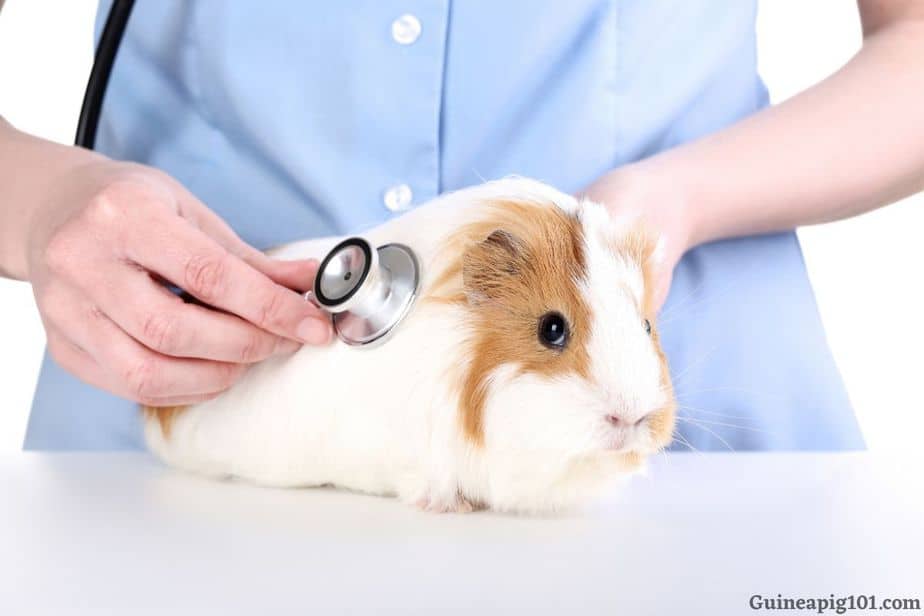
Guinea pigs are infected with a respiratory disease caused due to:
- Bacteria
- Viruses
- Fungi
- Parasites
Respiratory infections are usually fatal if left untreated. These can be identified by symptoms like wheezing and noisy breathing, while there may be other symptoms.
2) Bacterial Infections in guinea pigs
Bacterial infections are usually caused by:
- Pasteurella multocida (Serotypes A and D)
- Bordetella (Kennel cough)
- Pseudomonas aeruginosa
- Streptococcus
- Staphylococcus aureus
- Chlamydiosis
- Moraxella spp.
- Mycoplasmas: these bacteria do not have a cell wall around the cell membrane, so they’re difficult to treat with antibiotics.
Pneumonia is one of the most severe diseases of guinea pigs. It is caused by various bacteria like Bordetella and Streptococcus.
It mostly occurs in winters when the mercury level drops. The young, old, and pregnant guinea pigs are most susceptible.
Unhygienic or dirty hutch is a potential source of bacterial infections among guinea pigs.
Other animals can transfer infectious germs, especially wild animals. Care should be taken while handling multiple pets at home, wash your hands regularly to minimize the possibility of transmission of bacteria.
Symptoms of Bacterial Infections
Infections of guinea pig usually cause wheezing and breathing noise; there are other symptoms as follows:
- Discharge from the nose and runny eyes
- Coughing, sneezing, and wheezing
- Loss of appetite
- Lethargy and keeping quiet
- Mouth breathing instead of through the nose.
- Flaring of the nostrils
- Slow breathing (under 30 breaths per minute) or fast breathing (Tachypnoea: over 100 breaths per minute)
The bacterial infection is more often marked by slow breathing rather than tachypnoea in guinea pigs.
Treatment of Bacterial Infections
Snuffles in guinea pigs look similar to cold, but its effect on them is far more severe.
It affects the lungs, skin, and respiratory tract of guinea pigs. Early diagnosis and treatment are vital to save the life of the guinea pig.
The prescribed medications should be carefully followed at home until there are no more symptoms of infection is completely treated.
Although guinea pig snuffles might just look like a cold, they are much more severe than this. Bacterial infections should be diagnosed and treated as early as possible.
Your vet will prescribe medication for your guinea pig, and you will need to care for your guinea pig at home until the infection has cleared up.
Antibiotics are commonly used to treat bacterial infections. If the congestion in the respiratory tract is much more, then using a nebulizer to administer the antibacterial agent is recommended.
Few diseases like mycoplasma require additional drugs. After the guinea pig is brought back to home following care should be done:
- The cage of the guinea pig must is cleaned. Its cage, litter box, and toys are sterilized with a disinfectant.
- The guinea pig is kept in warm conditions, not very hot. Care should be taken while returning with the guinea pig from outdoors, that the temperature change is not too sudden.
- After you care for the guinea pig or even touch it, wash your hands.
- Check that other pets and children are kept away from the guinea pig during the recovery period.
3) Viral Infections in guinea pigs
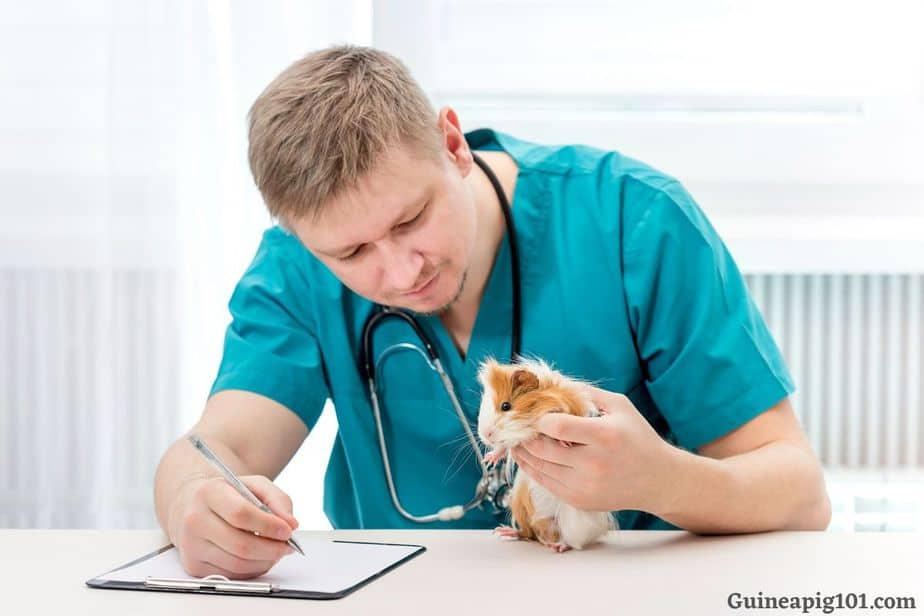
Guinea pigs are not much susceptible to viral infections like bacterial infections. They are sensitive to viral infections like cytomegalovirus, parainfluenza.
Respiratory Pneumonia is also found in guinea pigs caused by the Adenovirus.
It is more common in young guinea pigs to have low immunity. It may result in the sudden death of the guinea pigs.
Although the rate of disease spread among guinea pigs is low. The common signs of viral infections are:
- Unable to breathe properly & Congestion in the nasal passage
- Lethargy
- Milky eyes
- Ulcers and scabs on the face
- Fever/the guinea pig feels too hot to touch
Preventing Viral infection
Guinea pigs do not need any vaccinations against common diseases.
Other pet animals like dogs, cats, and rabbits are often vaccinated, but this is not the case in guinea pigs.
Many believe that myxomatosis, usually found in rabbits, is also a potential danger to guinea pigs, but this is not the case.
Instead, guinea pigs should be provided with a healthy diet rich in Vitamin C to keep them away from infections. Visit your vet for regular medical check-ups and avoid exposure to extreme cold.
4) Fungal Infection in guinea pigs
Guinea pigs are rarely infected by a fungal disease, except for a few.
Aspergillosis is a fungal infection found in guinea pigs affecting the breathing. That was caused due to the overgrowth of the fungus (Aspergillus fumigatus) in the nasal passage and lungs of the guinea pig.
Guinea pigs having weak immune systems are more exposed to this disease.
Young ones, old or guinea pigs who are already suffering from some illness who have weak or suppressed immune systems, easily get infected with fungus.
Symptoms of this disease are:
- Short breath and breathing from mouth
- Coughing and noisy breathe
- Lethargy and weakness
- Nasal discharge
- Flaring nostrils
The Aspergillus fungus develops on the decaying organic matter, so the left away food should be removed from the cage of the guinea pig every day.
Guinea pigs are found to be affected by another fungal infection called dermatophytosis.
Breathing problems are caused due to fungal skin lesions developing in the nostrils. Skin lesions on other parts of the body do not result in breathing disorders.
5) Blockage of air
If your guinea pig is coughing, unable to breathe correctly, and gasping for air, then there might be a blockage.
A blockage is caused due to obstructions which include:
- Hay stalks
- Brussel sprout stalks
- Raisins
- Grass seeds
- Peanuts or other small nuts
Nasal discharge coming from both nostrils is another symptom of blockage. Consult the veterinarian once you observe the above symptoms immediately.
6) Stress in guinea pigs
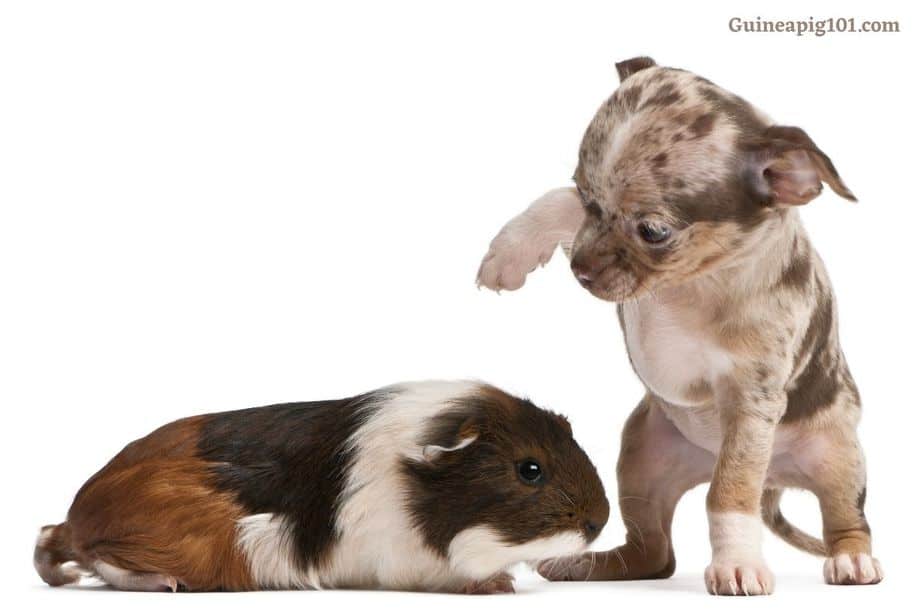
Guinea pigs subjected to stress can cause breathing disorders. Prolonged stress can cause severe breathing-related problems.
Breathing problems caused due to stress in guinea pigs have the following symptoms:
- Agitated grunts (regular)
- High-pitched screeches
- Repeated self-soothing or relaxing activities: For example, excessive licking or biting
- Tachypnoea or panting (more than 100 breaths per minute)
- Curling up in a ball for long periods.
- Showing distress at themselves
Chronic stress can also cause respiratory infections. Stress weakens the immune system of the guinea pig, and they can be easily infected by germs.
What Causes stress in guinea pigs
Guinea pigs are highly sensitive to even minor changes in their environment can cause intense stress to them.
The following things are few examples which create the guinea pigs:
- Sudden change in environmental conditions like temperature and living conditions.
- Change in the diet
- Cage or litter tray not cleaned properly
- Not enough space or small cage
- Cage facing towards a cooling current of air
- Poor diet or not enough food
- Intimidated by the presence of other pets in the household
- Staying with a highly dominating guinea pig
- Other health issues, especially dental problems
- Lack of activity and rejuvenation, waiting a long time in the cage
- Not being taken care of properly
How to prevent Stress in guinea pigs
It is a common belief that we are providing the best to our cavies, so they should not be under any kind of pressure.
There is always space of improvement, even if you are doing your best to make the guinea pigs feel comfortable.
To keep guinea pigs happy and stress-free, the following things should be done:
- Food and Water: Appropriate diet and variety of food are provided to the guinea pig. You should check that your guinea pig has fresh water available all through.
- Housing: Check whether the cage/hutch is big enough? Is it cleaned regularly? Whether the right temperature is maintained for guinea pigs?
- Socialization and Play: Care should be taken for activities and exercise. Guinea pigs need regular exercise.
- Protection from Others: Check whether your guinea pig is protected from other pets in the household and predators in the locality? Are the steps taken to reduce such interactions?
- Physical Health: Are you taking your pet for regular checkups to the veterinarian? The vet specialized in exotic pets is ideal.
Gradually make changes and improve the care for the guinea pig.
Guinea pigs aren’t comfortable to adapt to sudden changes, so small steps are beneficial.
7) Guinea Pig Allergies
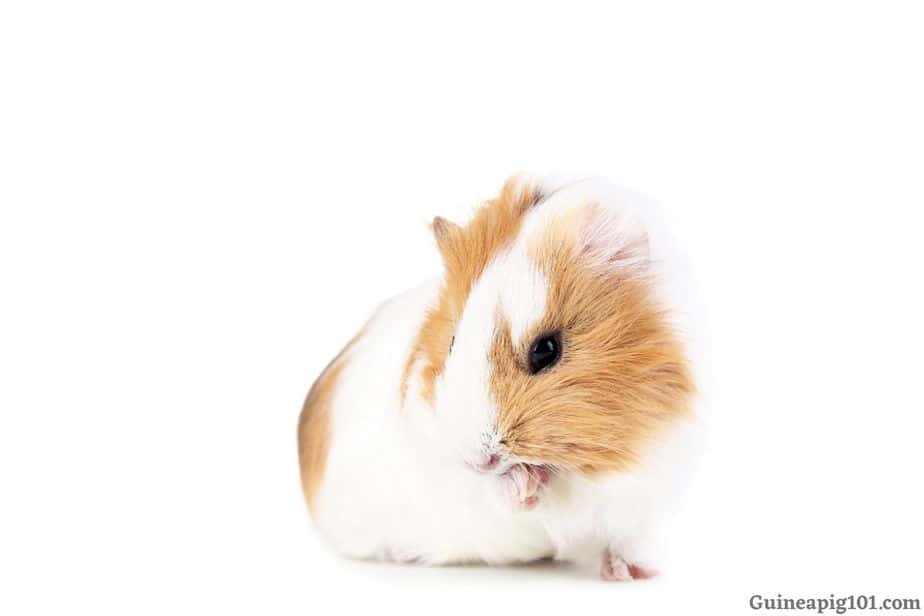
Breathing disorder can arise because of allergies or irritants in guinea pigs.
Guinea pigs are commonly affected by allergies as especially compared to cats and dogs. Also, they are susceptible to many irritants. These include:
- The smoke released from cigarettes or fire.
- Ammonia found in the urine of guinea pigs.
- Air fresheners.
- Carpet cleaning products
- Fleece washing liquid
- Dust and dirt.
- Hay dust
Allergy symptoms are coughing, sneezing, lethargy, rapid or slow breathing, and runny eyes and nose.
8) Heart diseases
Guinea pigs often suffer from cardiac disease. There is a jump in cardiac disease cases, maybe because of better diagnostic facilities to identify such illness or perhaps the longer life span of the domesticated guinea pigs.
Cardiac diseases are hard to be identified with no breathing disorder in the initial phase.
Breathing problems occur much later, and chances are there of the wrong diagnosis. The initial symptoms of cardiac disease are:
- Lethargy and deep sleeping
- Weight loss
- Reduced diet
- Abdominal distension
- Collapsing
- Pale bluish gums
- Labored breathing or wheezing noise, which may go away and return later.
In some rare cases, rapid or open-mouth breathing.
Causes of Cardiac Disease in Guinea pigs
The cause of the cardiac disease is still not known, but the common cause which is believed by the specialists are:
- Aging
- Heart Infection
- Dietary deficiencies
A Balanced diet and hygienic environment are advised to keep the guinea pig healthy and free from heart disease.
9) Guinea pig snoring
Guinea pigs may produce noise while sleeping. If it is a light clucking sound, then it is normal, but loud snoring is what you must be worried about.
Snoring is a symptom of any of the above-discussed diseases, such as infections, stress, and allergies. Other conditions that can cause snoring are tumors, hypothyroidism, and abscesses.
Guinea pigs suffering from obstructive sleep apnea (OSA) will stop breathing during sleep.
It is a severe disorder with symptoms like loud snoring and episodes of breathing interruption. In some cases, the breath may become very shallow or may even stop briefly while sleeping.
So, it is better to investigate the snoring of guinea pigs. As this disorder results in an insufficient supply of oxygen to the brain and body, ignorance of such activity can be severe.
Normal noises guinea pigs make
Guinea pig making noise indicates some diseases or problems, but few noises are normal for them.
They appear to be calm and quiet animals, but in reality, they are the opposite. Guinea pigs communicate among themselves through sound; in fact, a variety of sounds. They make noise when they are hungry or under some stress.
The sound produced by the guinea pigs is an attractive feature of them. Knowledge of the noise produced by guinea pigs helps the owner to understand their needs.
The sound which can be considered normal for guinea pigs are :
- Teeth chattering: Guinea pigs may chat their teeth or make a hissing when they are willing to be left alone. They make such sounds when they feel insecure and need to share the same space with someone else.
- Purring: Guinea pigs purr using their teeth. These sounds are very soft, so one needs to listen carefully. Guinea pigs are happy when they purr softly in a relaxed state. If they purr in a sharp and loud tone along with signs of stress, they are annoyed with something. It is often confused with teeth grinding, which is a severe problem for guinea pigs.
- Growling: It is sporadic when guinea pigs growl. They growl when they are afraid of something. Sometimes change in the environment may also trigger such noise. Be careful as they might even bite you. Try to calm down and remove any threats nearby.
- Wheeking: Guinea pigs make this noise when they are hungry and want your attention. They may produce a loud noise. They provide this sound even if they see you bringing some tasty treats for them.
- Rumbling: Guinea pigs make such noise when they try to allure the female partner for mating. The sound produced is soft and low pitched. The female guinea pig replies in the same tone upon acceptance.
- Chirping: Guinea pigs produce a sound similar to that of birds chirping. The purpose behind such a sound is still unknown.
- Cooing: It is typically like the sound produced by pigeons. Guinea pigs produce such to communicate with younger ones, especially by the parents. They connect with their babies to make them feel secure and safe.
Few sounds like grunting is considered normal. But repetitive grunt without any cause is an indication of respiratory disorder.
Guinea pigs need to undergo a complete checkup and diagnosis if found with any of the above symptoms, as the respiratory disorder can be fatal for their lives.
Sources: Respiratory infections, Viral Pneumonia in Guinea Pigs, Respiratory Bacterial Disease in Guinea Pigs, Mechanics of Respiration in Unanesthetized Guinea Pigs
